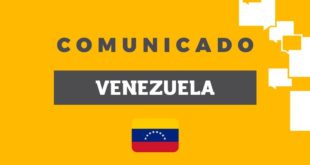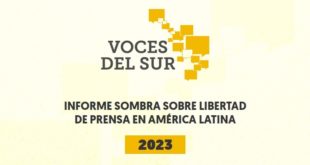El 06 de marzo de 2013, fueron interrogados y detenidos de manera arbitraria Jesús Alberto Yajure, reportero de Últimas Noticias, periódico privado de circulación nacional; y Andrew Rosati, corresponsal del Miami Herald, periódico de Estados Unidos, por funcionarios -vestidos de civil- de la Dirección de General Contrainteligencia Militar (adscritos al Ministerio para la Defensa). Los reporteros se encontraban realizando su labor periodística en la capilla del Hospital Militar Carlos Arvelo, donde se encontraban reunidos simpatizantes del oficialismo orando tras el fallecimiento de Hugo Chávez, Presidente de la República. El hecho ocurrió en Caracas, Distrito Capital.
Los funcionarios acusaron de ser “un espía” en Venezuela al reportero del Miami Herald, quien está en Caracas desde hace varias semanas cubriendo la situación política que enfrenta el país. A reportero de Últimas Noticias le borraron algunas fotografías que habían tomado días pasados en diversos pautas informativas, y le dijeron que estaba prohibido que la prensa estuviese en ese lugar.
Jesús Yajure, quien además pertenece a la Unidad de Investigación de Últimas Noticias, informó a IPYS Venezuela que acudió al lugar por una convocatoria de prensa que llegó al periódico para el que labora. El periodista estaba recogiendo los testimonios de las personas que se encontraban en la capilla del centro de salud cuando, de pronto, lo abordaron 3 personas de civil, y le pidieron que los acompañaran. Le preguntaron si era extranjero y que le mostrara su identificación.
Los efectivos, enseguida abordaron a Rosati, quien acababa de llegar al sitio, a raíz de las dificultades de salud que presentaba el primer mandatario nacional, para el entonces.
Uno de los funcionarios dijo: “Vamos a rebotar estos bichos”, contó Yajure. Los funcionarios les dijeron a los periodistas que esa era una zona militar y que debían acompañarlos. Yajure sacó su teléfono celular y uno de los funcionarios le dijo que se lo entregara. El periodista le manifestó que él debía realizar una llamada, y les dijo que no los iba a acompañar porque él no había cometido ninguna irregularidad, y que solamente estaba realizando su labor. Allí, uno de los funcionarios le mostró la identificación como efectivo de la Dirección General de Contrainteligencia Militar, pero Yajure no logró detallar el nombre.
Durante el incidente, un funcionario le dijo a Yajure que se calmara y que esa no era la manera de hacer las cosas. Otra mujer agente que integraba el equipo le dijo al reportero de Últimas Noticias que se calmara y lazó una amenaza: “¿Tú no sabes que alterar el orden público es un delito?”.
Yajure se acercó a Andrew para explicarle lo que estaba ocurriendo. Un efectivo tomó por el brazo al reportero de Últimas Noticias y le dijo que no podía hablar con su colega. Les dijeron que caminara un reportero adelante y otro atrás. Los obligaron a movilizarse hasta un cafetín que se encontraba a alrededor de 150 metros de la capilla. Allí los sentaron, en mesas distintas, para interrogarlos. Tres funcionarios acompañaban a Rosati; y dos a Yajure.
Eres un “espía”
Según el relato que ofreció a IPYS Venezuela, Rosati fue detenido de manera arbitraria e interrogado, por espacio de 2 horas. Los efectivos le pidieron documentos de identificación. Le preguntaron, entre otros asuntos, que dé dónde venía él, que qué hacía en Venezuela, y cuál era su salario. También, le preguntaron por qué no tenía un credencial de prensa que le otorga el Ministerio de Comunicación e Información a la prensa extranjera.
Cuando el periodista dijo que era estadounidense, lo acusaron de “ser un espía”, dejando entrever que realizaba trabajo de inteligencia en contra del gobierno de Venezuela. Rosati explicó que él era periodista, que colaboraba para distintos medios, y que estaba en Venezuela para realizar su labor informativa.
Al corresponsal extranjero también le quitaron su teléfono celular, le revisaron su libreta de contacto y sus cuentas de las redes sociales que tenía asociadas en el móvil. Le preguntaron que por qué tenía contactos de personas vinculadas a fuerzas políticas de oposición. También, le revisaron el material que tenía guardado en su cámara fotográfica. Luego llegó otro funcionario, que se mostró como el superior, finalizó el procedimiento, y le advirtió que era mejor que se fuera del lugar.
“No estás detenido”
Entre tanto, a Jesús Yajure los funcionarios le revisaron la libreta de sus apuntes de las entrevistas que había realizado en el lugar. Entre otras cosas, le preguntaron por su número de cédula, dónde trabajaba, y los nombres de sus jefes inmediatos.
Yajure recibió una llamada de la unidad de transporte que lo iría a recoger al lugar luego de la pauta. Les dijo que por favor avisaran al periódico que lo tenían retenido. Los efectivos le pidieron el celular y le dijeron que les mostrara las fotografías que había tomado, que ellos sabían que él tenía imágenes. El reportero tuvo que mostrarle las fotografías que había realizado y le explicó que en ellas no había nada de malo y que él no estaba cometiendo ningún delito. Le pidieron que las borrara.
Uno de los funcionarios le manifestó que ellos le pedían a los periodistas que hicieran bien su labor, dando a entender que no difundieran noticias que perjudicaran a la actual gestión gubernamental. Entre las preguntas que le hacía, Yajure les dijo que él no tenía por qué contestar el interrogatorio porque él estaba haciendo su labor, y ellos era funcionarios que no estaban identificados.
Los efectivos respondieron que eso no es un interrogatorio, y lo amenazaron si él quería ver un interrogatorio de verdad. Insistieron en que, tampoco, lo tenían detenido.
Yajure recibió una llamada y les dijo a los funcionarios que era una de sus jefes del periódico. Le pidieron que atendiera la llamada, calmara la situación, y les manifestara que en 10 minutos lo iban a dejar ir. Luego, los funcionarios lo llevaron hasta la puerta de la capilla, donde lo habían interceptado. Le comentaron que lo iban a dejar ahí, para que las personas que habían visto que los funcionarios lo había abordado, se dieran cuenta que no le habían hecho ningún daño y no lo tenía ninguna agresión. También, le ordenaron que no volviera entrar a la capilla, y que si quería realizar su labor, espera en la acera de afuera del templo para recoger los testimonios.
Uso abusivo del poder estatal
Este incidente demuestra un uso abusivo del poder estatal por parte de los funcionarios de inteligencia militar debido a que realizaron una detención arbitraria e intentaron impedir la labor de los periodistas, lo cual es una evidente violación a la libertad de expresión e información. Asimismo, este procedimiento se considera una violación al debido proceso, debido a que se realizó un interrogatorio sin ninguna orden legal.
Este hecho se enmarca en una serie de violaciones a la libertad de prensa que ha reportado IPYS Venezuela, en el marco de la cobertura informativa de la prensa ante el fallecimiento de Hugo Chávez, quien estaba al frente de la Presidencia de la República (/search.aspx?search=+Ch%C3%A1vez++marzo+2013).
_________________________________________________________________
Lea la versión en inglés
Military counter-intelligence officers detained and interrogated journalists covering the news of the death of Hugo Chávez
On March 6, 2013, Jesús Alberto Yajure, reporter of Últimas Noticias, a private newspaper that circulates nationwide, and Andrew Rosati, correspondent of the Miami Herald, a U.S. newspaper, were abruptly interrogated and detained by officials -dressed in civilian clothing- of the General Military Counter-intelligence office (ascribed to the Ministry of Defense). The reporters were doing their job in the chapel of the Carlos Arvelo military hospital, where official party supporters were praying due to the death of Hugo Chávez, the president of the republic, when they were interrogated and arbitrarily detained. This happened in Caracas, capital district.
The officials accused the Miami Herald reporter who is in Caracas since several weeks covering the nation´s political situation, of being “a spy” in Venezuela. Some photographs the reporter of Últimas Noticias had taken in previous days on several info events were erased, and he was told that the press was forbidden from being there.
Jesús Yajure, who also works at the Investigation Unit of Últimas Noticias, informed IPYS Venezuela that he went to the location because of a press call which was sent to the newspaper he works for. The journalist was taping the testimonies of the persons in the chapel of the healthcare center when 3 persons in civilian clothing suddenly approached him and asked him to accompany them. They asked him if he was a foreigner and asked him to show them his identity papers.
The officials then broached Rosati, who had just arrived to cover the head of state´s health state.
One of the officials said “We are going to flick these bugs away”, Yajure mentioned. The officials told the journalists that that was a military zone and that he had to accompany them. Yajure produced his cell phone and one of the officials told him to hand it over. The journalist stated that he had to make a phone call and told them that he would not go with them because he had committed no irregularity and he was there only to do his job. Then, one of the officials showed him his identification as a General Military Counter-intelligence office, but Yajure did not manage to see the man´s name.
During the incident, an official told Yajure to calm down, that that was not the way to do things. Another female agent in the team told the reporter of Últimas Noticias to calm down and launched a threat: “Don´t you know that altering the public order is a crime?”.
Yajure approached Andrew to explain to him what was going on. An official took him by the arm and told him he could not talk to his colleague. They told them to walk one reporter behind the other. They forced them to walk to a coffee stand about 150 meters away from the chapel. They sat them down in different tables and proceeded to interrogate them. Three officers accompanied Rosati and two accompanied Yajure.
You are a “spy”
Based on the story told to IPYS Venezuela, Rosati was arbitrarily detained and interrogated for 2 hours. The officials asked for their identity documents. They asked -among other questions – where he came from, what he was doing in Venezuela, and how much did he earn. They also asked why he did not have a press credential issued by the ministry of communication and information to the foreign press.
When the journalist said he was an American they accused him of “being a spy”, implying that he was doing intelligence work against the government of Venezuela. Rosati explained that he was a journalist, that he collaborated with various media, and that he was in Venezuela to do his job.
The foreign correspondent was also stripped of his cell phone and his contact book and social network accounts were checked through his cell phone. They asked him why he had contact with persons linked to the opposition political parties. They also looked at the material he had in his camera memory. Another officer arrived who was a superior in rank, ended the procedure and warned him that it was best for him to leave the premises.
“You are not arrested”
Meanwhile the officials checked Jesús Yajure´s contact book and his notes on the interviews he had conducted there. Among other things, they asked him his identity card number, where he worked and the name of his immediate bosses.
Yajure received a call from the transport unit who would pick him up after the assignment. He asked them to please advise the newspaper that he was being retained. The officials asked him for his cell phone and asked him to show them the photos he had taken, saying they knew he had taken photos. The reporter was forced to show them his photographs and explained that he had done no wrong and that he had committed no crime. They asked him to erase all of them.
One of the officials explained that they asked the journalists to do their job properly, implying that they should not air news that went counter to, or damaged the reputation of the current government. Among the questions posed, Yajure told them that there was no reason for him to answer the interrogation because he was merely doing his job, and they were not even identified as officials.
The officials responded that this was not an interrogation proceeding, and threatened to show what a real interrogation was like. They insisted that they were not keeping him against his will.
Yajure received a call and told the officials that it was one of his female bosses. They asked him to answer the call, calm the situation and tell her that in 10 minutes they would let him go. Then the officials took him to the door of the chapel, from where they had intercepted him. They commented that they would leave him there so that the persons who had seen the officials broach him to realize that he had suffered no harm and had not been assaulted. They also instructed him not to enter the chapel, and that if he wanted to do his job that he should wait in the curb outside the temple to get his testimonials.
Abusive Use of the State´sPower
This incident demonstrates an abusive use of the state´s power by military intelligence officials since they conducted an arbitrary detention and attempted to hinder the work of the journalists, an evident violation of the freedom of expression and information. This procedure is also considered a breach of due process, since an interrogation was conducted without a legal warrant.
This is one other event in a series de violations to the freedom of press reported by IPYS Venezuela, in the press information coverage due to the passing away of Hugo Chávez, the former president of the republic (/search.aspx?search=+Ch%C3%A1vez++marzo+2013).
Label: abusiveuse of the state´spower, arbitrarydetentions, censorship, intimidation
 IPYS Instituto Prensa y Sociedad Venezuela
IPYS Instituto Prensa y Sociedad Venezuela



